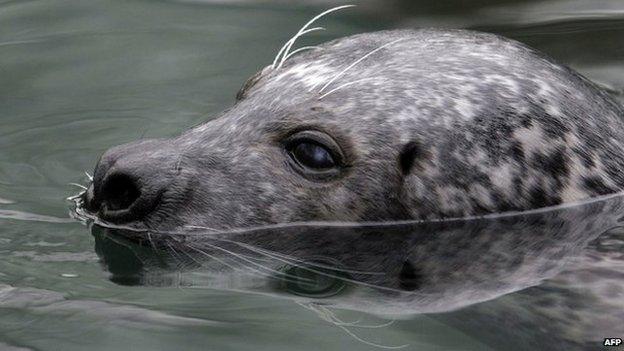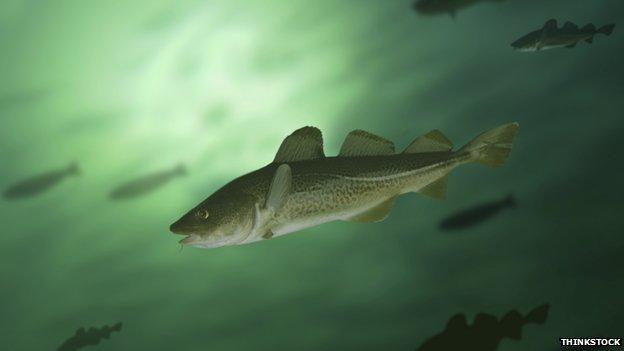Grey seals are compromising cod stock recovery plans
- Published

The vast majority of the UK's grey seal population lives in Scottish waters
Grey seals are compromising the recovery of cod stocks off the west coast of Scotland, research has suggested.
The cod population has been in long-term decline for many years, largely due to fishing.
The EU introduced a recovery plan to try and curb cod fishing, but this appears to have had a limited effect.
The study found that although cod fishing has now halved, predation by seals has rapidly increased.
Grey seal populations increased significantly after the passing of conservation laws in the 1970s but, more recently, their numbers in the west of Scotland have levelled off at around 30,000 to 40,000.
The seals are believed to consume nearly 7,000 tonnes of cod each year off the west of Scotland, where landed catches now amount to only a few hundred tonnes.
Researchers from the University of Strathclyde said the amount of cod being eaten by seals was preventing stocks of the fish from recovering.


Historical scapegoats?
The impact of grey seals on cod stocks has been a controversial topic for decades.
Fishermen have anecdotally blamed seals for the reduction of Atlantic cod stocks, and various studies have been undertaken to determine whether or not this is true.
In 2012, the Canadian Senate approved a controversial plan to kill 70,000 grey seals in the Gulf of St Lawrence under a bounty system, ostensibly to revive the cod stocks that the seals were eating.
However, a group of marine scientists objected at the time, stating that there was "no credible scientific evidence" that the cull would have its intended effect.

Dr Robin Cook, who led the study, said: "It appears that fishing played a major part in the decline of the cod but increasing predation by seals is preventing the stock from recovering, even though the amount of fishing has reduced.
"Fishery managers face striking a difficult balance. With high predation by seals, the cod stock will struggle to improve and the recovery plan may not deliver the expected results. We may have to live with smaller cod stocks if we want to protect our seals."
An EU plan to aid recovery of cod stocks placed strict restrictions on the amount of time fishermen can spend at sea as stocks fell to 5% of what they were in 1981 but the researchers are now urging a change in the plan.
'Vulnerable to predation'
In some years before the recovery plan was in force, fishing accounted for around 50% of the total weight of the cod stock but the study found that, although fishing has now halved, predation by seals has rapidly increased, with the animals eating up more than 40% of the total stock.
Dr Steven Holmes, of the European Commission Joint Research Centre, who co-authored the report, said: "Seal populations have increased on the west coast of Scotland and they also seem to be able to find the cod just as easily, even though the stock is now small.
He warned: "This makes the remaining stock very vulnerable to predation."
The research has been published in the Journal of Applied Ecology.
More than 90% of British grey seals breed in Scotland, the majority in the Hebrides and Orkney.
They eat a wide range of fish, but sand eels - a small, thin fish that lives near the sea bed - form the largest part of their diet.
Although cod form only around 10% of the total weight of fish eaten by seals, the study suggests this is sufficient to have a significant impact on the stock.